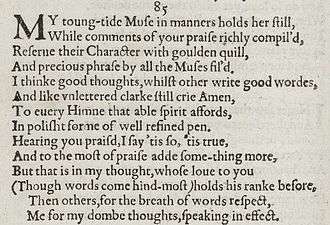Sonnet 85
| Sonnet 85 | |||||||
|---|---|---|---|---|---|---|---|
 Sonnet 85 in the 1609 Quarto | |||||||
|
| |||||||
| |||||||
Sonnet 85 is one of 154 sonnets written by the English playwright and poet William Shakespeare. It is a member of the Fair Youth sequence, in which the poet expresses his love towards a young man, and the eighth sonnet of the Rival Poet subsequence.
Synopsis
The poet's inarticulacy compares with the golden words of other poets. The poet's thoughts are good, but others are more impressive in expression. All the poet can do is agree with the praises of others and offer his own dumb sincerity.
Structure
Sonnet 85 is an English or Shakespearean sonnet. The English sonnet has three quatrains, followed by a final rhyming couplet. It follows the typical rhyme scheme of the form, abab cdcd efef gg and is composed in iambic pentameter, a type of poetic metre based on five pairs of metrically weak/strong syllabic positions. The 1st line exemplifies a regular iambic pentameter:
× / × / × / × / × / My tongue-tied Muse in manners holds her still, × / × / × / / × × / While comments of your praise richly compiled, (85.1-2)
- / = ictus, a metrically strong syllabic position. × = nonictus.
This is followed (in line 2) by a mid-line reversal ("richly"). A more common initial reversal occurs in line 9. In the final line, "dumb thoughts", a monosyllabic adjective + noun, would most naturally fill × / positions. Its shift here suggests that a contrastive accent is to be applied to "dumb", which is indeed followed closely by its antithesis "speaking".
The meter demands a few variant pronunciations: line 7's "spirit" would have been pronounced as 1 syllable (possibly as spear't, sprite, sprit, or spurt[2]),[3] and line 8's "refinèd" as 3.[4]
Notes
- ↑ Pooler, C[harles] Knox, ed. (1918). The Works of Shakespeare: Sonnets. The Arden Shakespeare [1st series]. London: Methuen & Company. OCLC 4770201.
- ↑ Booth 2000, p. 262.
- ↑ Booth 2000, p. 287.
- ↑ Booth 2000, p. 75.
References
- First edition and facsimile
- Shakespeare, William (1609). Shake-speares Sonnets: Never Before Imprinted. London: Thomas Thorpe.
- Lee, Sidney, ed. (1905). Shakespeares Sonnets: Being a reproduction in facsimile of the first edition. Oxford: Clarendon Press. OCLC 458829162.
- Variorum editions
- Alden, Raymond Macdonald, ed. (1916). The Sonnets of Shakespeare. Boston: Houghton Mifflin Company. OCLC 234756.
- Rollins, Hyder Edward, ed. (1944). A New Variorum Edition of Shakespeare: The Sonnets [2 Volumes]. Philadelphia: J. B. Lippincott & Co. OCLC 6028485.
- Modern critical editions
- Atkins, Carl D., ed. (2007). Shakespeare's Sonnets: With Three Hundred Years of Commentary. Madison: Fairleigh Dickinson University Press. ISBN 978-0-8386-4163-7. OCLC 86090499.
- Booth, Stephen, ed. (2000) [1st ed. 1977]. Shakespeare's Sonnets (Rev. ed.). New Haven: Yale Nota Bene. ISBN 0-300-01959-9. OCLC 2968040.
- Burrow, Colin, ed. (2002). The Complete Sonnets and Poems. The Oxford Shakespeare. Oxford: Oxford University Press. ISBN 978-0192819338. OCLC 48532938.
- Duncan-Jones, Katherine, ed. (2010) [1st ed. 1997]. Shakespeare's Sonnets. The Arden Shakespeare, Third Series (Rev. ed.). London: Bloomsbury. ISBN 978-1-4080-1797-5. OCLC 755065951.
- Evans, G. Blakemore, ed. (1996). The Sonnets. The New Cambridge Shakespeare. Cambridge: Cambridge University Press. ISBN 978-0521294034. OCLC 32272082.
- Kerrigan, John, ed. (1995) [1st ed. 1986]. The Sonnets ; and, A Lover's Complaint. New Penguin Shakespeare (Rev. ed.). Penguin Books. ISBN 0-14-070732-8. OCLC 15018446.
- Mowat, Barbara A.; Werstine, Paul, eds. (2006). Shakespeare's Sonnets & Poems. Folger Shakespeare Library. New York: Washington Square Press. ISBN 978-0743273282. OCLC 64594469.
- Orgel, Stephen, ed. (2001). The Sonnets. The Pelican Shakespeare (Rev. ed.). New York: Penguin Books. ISBN 978-0140714531. OCLC 46683809.
- Vendler, Helen, ed. (1997). The Art of Shakespeare's Sonnets. Cambridge, MA: The Belknap Press of Harvard University Press. ISBN 0-674-63712-7. OCLC 36806589.
.png)
